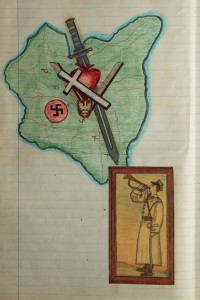Second World War

First scene of Second World War
The year 1939 will remain memorable forever for the Polish people and many other nations. In the early spring of that year, the dark clouds were gathering, it seemed that war would be inevitable so people wondered what their tomorrows would bring.
Large numbers of soldiers were called up for reserve exercises in the spring, sadly many would never return home. Global political tensions were being stretched to the limit. Hitler in a series of bloodless coups took whatever territory he could. Thus the Rhineland, Austria, Sudetenland, Danzig, Klaipeda and finally, the Czech Republic were swallowed up.
The only unoccupied country left that would fit into his plans, and such a move surely should have been anticipated, was Poland. The Polish government couldn’t, or wouldn’t, believe that Germany would widen its grasp to create an even greater Germany. Who knows what the Polish Intelligence service were doing for they seemed not to have any inkling of Hitler’s intentions. Worse they also seemed not to know what was happening within Poland.
Spies from neighbouring countries worked in Poland with, it seems, impunity. Internal authorities were helpless to stop it. Polish citizens of German or Ukrainian origin worked openly for Germany or Russia, following each countries political goals. In retrospect it was a hard learned lesson on how to treat, or govern minority groups in the Polish State. These minorities at the outbreak of war had become dynamic forces that were able to paralyze the national defenses that would quickly destroy Poland from within.
Unforgivable political and strategic mistakes were made by Marshal Rydz Smigly and the government of the time. The troops were ordered to “march on Zaolzie” at a time when the threat of war hung over Poland like the sword of Damocles. “Commander lead us” was the popular slogan of those fanatics who were blind to everything that was going on around them.
The Polish army was absurdly outfitted and not capable of any military actions in modern warfare. The popular press and radio proclaimed ad nauseum “we are strong, together and ready.” Forty cavalry regiments were equipped with light horses and sabers to do battle. In reality they were more fit for parades than military action. The Infantry did not have any motorized vehicles, so mobility at the front was a huge issue. Even supplies were moved by horse and wagon. The armoured equipment supplied to these poor souls were museum pieces.
The rank and file of all branches, including aviation and naval were very well educated but lacked the necessary equipment to fight against the German juggernaut.
The Ribbentrop-Molotov pact, entered into by Germany and Moscow just before the war, created grave new problems for Poland. Then on that memorable day in September that one word “War” changed everything. Long crowded trains started carrying reservists to the various regiments. The normally quiet skies suddenly were filled with enemy aircraft, the ground shuddered from what later became known as the blitzkrieg as bombs tore the country apart. By the third day of the war, all Poland was under a clouds of smoke coming from the bombed and burning towns and villages. Resistance was swift but futile against such a powerful enemy. At the end of two weeks of desperate fighting sometimes to the death, the Polish army collapsed. Desertion by Polish Ukrainians and Germans quickly became frantic as soldiers still armed spread panic by telling people rumours about the state of the war. The weapons used by the deserters behind the front lines further added to the chaotic situation.
The Germans used five battalions to conquer Poland they were led by four famed generals, Blaskowitz, van Reichenau, van Kluge, there was one more whose name escapes me. Field Marshal List commanded an armoured army division active in Czechoslovakia on an area near Krakow and towards Lviv.
The Polish commanders were Generals Rommel, Kutrzeba, Bortnowski, Przedrzymirski, and Szyling. General Maczek was the commander of the only Polish armoured division facing the battle group commanded by field Marshal List.
Leave a Reply